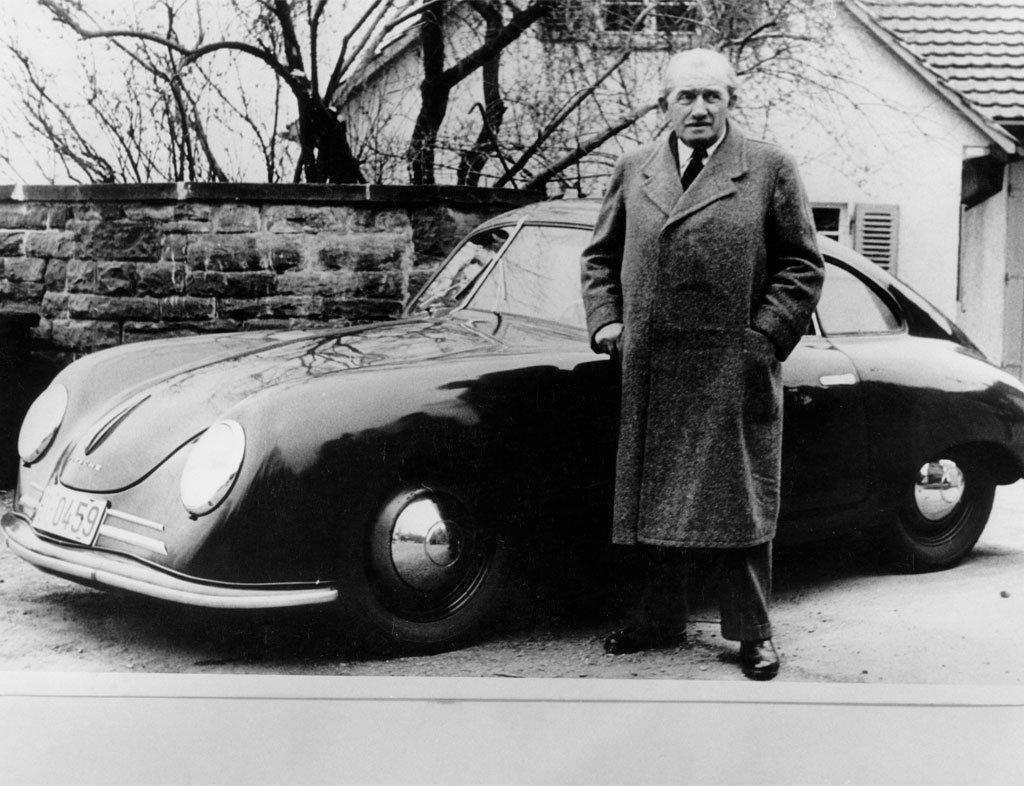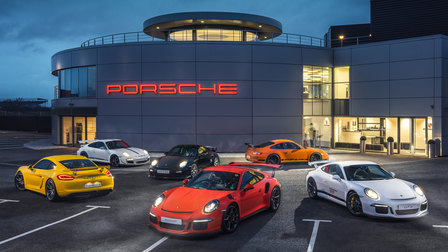Porsche is a German sports car manufacturer founded in 1931 by Ferdinand Porsche. The company is headquartered in Stuttgart, Germany and is known for its high-performance, luxury sports cars. Porsche is one of the most iconic and recognizable brands in the automotive industry, with a reputation for engineering excellence and design innovation.
Porsche began as a design and engineering consultancy, working with a variety of automotive manufacturers to develop new cars and components. One of the company’s most notable projects during this time was the development of the Volkswagen Beetle, which was designed by Ferdinand Porsche himself. In 1948, Porsche introduced its first sports car, the 356, which was a lightweight, rear-engined vehicle that quickly became popular with sports car enthusiasts.
Over the years, Porsche has continued to develop and refine its sports car offerings, introducing a range of models that cater to a variety of customers. These include the iconic 911, the mid-engine Boxster and Cayman, and the luxury Panamera sedan. Porsche also offers high-performance SUVs, such as the Cayenne and Macan, which have been well-received by consumers.
Porsche’s success can be attributed to several factors, including its commitment to engineering excellence, its focus on driver experience and performance, and its strong brand identity. The company has also been successful in diversifying its revenue streams, with its merchandise sales, motorsport activities, and Porsche Experience Centers all contributing to its bottom line.
Today, Porsche is a global brand with a loyal following of enthusiasts and fans. The company continues to innovate and push the boundaries of automotive technology, with a focus on sustainability and electric mobility. In 2019, Porsche introduced its first all-electric vehicle, the Taycan, which has been praised for its performance and driving experience. Overall, Porsche’s introduction as a sports car manufacturer has led to its growth into a global icon of luxury and performance, with a strong legacy and a bright future ahead.
Founding History of Porsche
Porsche was founded in 1931 by Ferdinand Porsche, a renowned automotive engineer and designer. Ferdinand Porsche had worked in the automotive industry for many years, designing and developing cars for a variety of manufacturers. He was particularly well-known for his work on the Volkswagen Beetle, which was designed by Porsche and his team in the 1930s.

In 1931, Ferdinand Porsche founded his own engineering consultancy, called Porsche GmbH, which was based in Stuttgart, Germany. The company initially focused on developing automotive technology, and worked on projects for a variety of manufacturers. One of its most notable early projects was the development of the Auto Union Grand Prix racing cars, which were highly successful in the 1930s.
In the years leading up to World War II, Porsche continued to work on a variety of automotive projects, including military vehicles for the German army. During this time, Ferdinand Porsche also developed his own sports car design, which he called the Porsche 64. This car was based on the Volkswagen Beetle and was intended to be a high-performance sports car for the masses.
After World War II, Ferdinand Porsche and his team focused on developing the Porsche 356, which was the company’s first production sports car. The 356 was a lightweight, rear-engined vehicle that quickly became popular with sports car enthusiasts. Over the years, Porsche continued to refine and develop the 356, introducing new models and improvements to the design.
In the 1960s, Porsche introduced its most iconic model, the Porsche 911. The 911 was an instant success, and has remained a popular and highly-regarded sports car to this day. Porsche continued to expand its product line, introducing new models such as the mid-engine Boxster and Cayman, and the luxury Panamera sedan.
Today, Porsche is one of the most well-known and respected automotive brands in the world, with a reputation for engineering excellence, performance, and design. The company’s founding history is marked by a commitment to innovation and engineering, which has helped it to become one of the most successful and iconic sports car manufacturers in history.
What makes Porsche so successful and iconic?
Porsche is one of the most successful and iconic automotive brands in the world, and there are several key factors that have contributed to its success.
Engineering Excellence: Porsche has a long-standing reputation for engineering excellence, which has been cultivated over many decades. The company is known for its innovative designs, precision engineering, and high-quality materials. Porsche engineers have consistently pushed the boundaries of what is possible in automotive design, resulting in cars that are both high-performance and reliable.
Racing Heritage: Porsche has a long and storied history in motorsports, which has helped to elevate the brand’s reputation and status. The company has competed in some of the most prestigious races in the world, including the 24 Hours of Le Mans, and has achieved numerous victories and championships. Porsche’s racing success has helped to establish the brand as a symbol of performance and excellence.
Iconic Designs: Porsche is known for its iconic designs, which have become instantly recognizable around the world. The Porsche 911, in particular, has become an icon of automotive design, with its distinctive shape and timeless style. Porsche’s commitment to design has helped to differentiate the brand from its competitors and has contributed to its enduring popularity.
Brand Loyalty: Porsche has developed a fiercely loyal fan base over the years, with many customers becoming lifelong advocates for the brand. This loyalty has been built on a reputation for quality, performance, and innovation, as well as a strong sense of community and camaraderie among Porsche enthusiasts.
Innovation: Porsche has always been at the forefront of automotive innovation, consistently pushing the boundaries of what is possible in terms of performance and technology. The company has introduced a number of groundbreaking technologies over the years, including the first hybrid sports car (the Porsche 918 Spyder) and the first fully-electric Porsche (the Taycan).
In conclusion, Porsche’s success and iconic status can be attributed to a combination of factors, including engineering excellence, racing heritage, iconic designs, brand loyalty, and innovation. These elements have helped to establish Porsche as a leading automotive brand, and have ensured that it remains one of the most highly-regarded and respected names in the industry.
Marketing Strategies of Porsche
Porsche’s marketing strategies have been an important contributor to the brand’s success and enduring popularity. Here are some of the key elements of Porsche’s marketing strategy:
Targeted Marketing: Porsche’s marketing is highly targeted towards a specific audience of high-end consumers who are passionate about high-performance cars. The brand uses data and insights to identify and understand the needs and preferences of its target audience, and tailors marketing messages and campaigns accordingly. For example, Porsche has used social media and online advertising to reach younger, tech-savvy consumers who are interested in luxury and performance.
Brand Positioning: Porsche has positioned itself as a brand that is synonymous with performance, innovation, and luxury. This positioning is reflected in all aspects of the brand’s marketing, from advertising to product design and even the customer experience. For example, Porsche’s advertising often focuses on the performance and handling of its cars, while the design of the cars themselves emphasizes aerodynamics and speed.
Emotional Marketing: Porsche uses emotional marketing techniques to appeal to the emotions and aspirations of its target audience. This includes creating experiences that tap into the excitement and passion of high-performance driving, as well as leveraging the brand’s history and legacy to build a sense of nostalgia and heritage. For example, Porsche has created a range of experiences that allow customers to drive its cars on racetracks and other high-performance settings, tapping into the thrill of speed and power.
Integrated Marketing Communications: Porsche’s marketing efforts are highly integrated, with consistent messaging and branding across all channels and touchpoints. This includes leveraging a range of channels and media, from print and digital advertising to social media and experiential marketing events. For example, Porsche has used Instagram to showcase its products and experiences, while also creating branded content and collaborations with influencers and other partners.
Experiential Marketing: Porsche places a strong emphasis on experiential marketing, creating opportunities for potential customers to engage with the brand and experience its products in person. This includes events such as test drives, track days, and other driving experiences that allow customers to feel the performance and luxury of Porsche cars first-hand. For example, Porsche offers a range of driving experiences and events, including the Porsche Experience Center in Atlanta, which offers a range of driving experiences and courses for customers and enthusiasts.
Partnerships and Sponsorships: Porsche has developed partnerships and sponsorships with a range of high-profile organizations and events, including sports teams, cultural events, and motorsports competitions. These partnerships help to build brand recognition and visibility, while also aligning the brand with key values and interests of its target audience. For example, Porsche has sponsored the Super Bowl and the UEFA Champions League, as well as partnering with organizations such as the Museum of Modern Art and the TED conference.
Customer Experience: Porsche places a strong emphasis on providing an exceptional customer experience, from the moment a potential customer first interacts with the brand through the entire ownership journey. This includes personalized services and experiences, such as Porsche’s “Exclusive” program, which allows customers to customize their cars and create a truly unique and personalized vehicle. For example, Porsche offers a range of services and experiences designed to make ownership of its cars as seamless and enjoyable as possible, including concierge services, maintenance programs, and personalized support for customers.
Overall, Porsche’s marketing strategy is highly focused, targeted, and integrated, with a strong emphasis on performance, luxury, and emotion. The brand’s ability to connect with its target audience on an emotional level, while also delivering exceptional products and experiences, has helped to establish Porsche as one of the most successful and iconic automotive brands in the world.
Brand Campaigns of Porsche
Porsche has a long history of creating memorable and effective brand campaigns that have helped to establish the brand as an icon in the automotive industry. Here are some examples of notable brand campaigns by Porsche:
“There is no substitute” (1990):
Porsche’s “There is no substitute” brand campaign was launched in 1990 and quickly became one of the most iconic and recognizable campaigns in the automotive industry. The campaign featured a series of television commercials that showcased the Porsche 911, and emphasized the car’s superior performance, handling, and engineering.
The “There is no substitute” tagline was designed to communicate the idea that the Porsche 911 was the ultimate sports car, and that there was simply no substitute for its unique combination of style, performance, and technology. The tagline became synonymous with the Porsche brand, and has been used in marketing and advertising ever since.
The TV commercials that accompanied the campaign were notable for their high production values, and for their focus on the driving experience. The ads featured fast-paced, cinematic footage of the Porsche 911 in action, with a focus on the car’s speed, handling, and sound. The ads also highlighted the car’s unique design features, such as its iconic rear-mounted engine and distinctive body styling.
The “There is no substitute” campaign was hugely successful for Porsche, helping to establish the brand as a leader in the sports car segment and contributing to the enduring popularity of the Porsche 911. The campaign was also notable for its longevity, as the tagline has remained in use for more than three decades, and is still a key part of the Porsche brand’s marketing and advertising today.
“Porsche. Engineered for magic. Everyday” (2015):
“Porsche. Engineered for magic. Everyday” is a brand campaign that was launched by Porsche in 2017. The campaign was designed to highlight the everyday usability of Porsche’s sports cars, while also emphasizing the brand’s commitment to engineering excellence and technological innovation.
The campaign included a series of television commercials and print ads that showcased various Porsche models in real-world driving situations. The ads were notable for their emphasis on the unique driving experience offered by Porsche’s sports cars, as well as for their focus on the advanced engineering and technology that underpins Porsche’s products.
The tagline “Engineered for magic. Everyday” was chosen to communicate the idea that Porsche’s cars are not only designed to offer exceptional performance and handling, but also to be practical and usable in everyday situations. The tagline also emphasized the brand’s commitment to engineering excellence, and suggested that the magic of Porsche’s cars is the result of a combination of advanced technology, precision engineering, and meticulous attention to detail.
The campaign was supported by a range of marketing activities, including experiential events, digital and social media advertising, and in-dealership promotions. The aim was to engage with potential customers at every touchpoint, and to communicate the unique value proposition of Porsche’s products.
The “Engineered for magic. Everyday” campaign has been successful for Porsche, helping to reinforce the brand’s position as a leader in the luxury sports car segment, and to attract new customers who are looking for a combination of high performance and everyday usability. The campaign also demonstrates Porsche’s commitment to innovation and engineering excellence, and highlights the brand’s unique value proposition in a highly competitive market.
“The Sound of Porsche” (2014):
“The Sound of Porsche” was a brand campaign launched by Porsche in 2014, which focused on emphasizing the unique sound of their sports cars. The campaign’s main objective was to showcase the connection between the sound of a Porsche engine and the driving experience that it offers.
The campaign featured a microsite, which allowed users to experience the sounds of different Porsche models, including the 911, Boxster, and Cayman. The microsite also featured an interactive sound map, which displayed the locations of iconic Porsche cars and the sounds they made in different parts of the world.
In addition to the microsite, the campaign also featured a series of short films that showcased the sounds of Porsche engines. The films highlighted the engineering and design processes that go into creating the distinct sound of a Porsche, emphasizing the craftsmanship and attention to detail that the brand is known for.
Overall, “The Sound of Porsche” campaign was successful in creating an emotional connection between the brand and its customers. By highlighting the unique sound of Porsche engines, the campaign reinforced the brand’s reputation for delivering a thrilling driving experience. It also emphasized the brand’s commitment to innovation and quality, which are key values that have helped Porsche maintain its status as a leading luxury car brand.
“The Heist” (2020):
“The Heist” is a brand campaign that was launched by Porsche in 2020 to promote the brand’s first all-electric vehicle, the Porsche Taycan. The campaign was designed to showcase the innovation and cutting-edge technology behind the Taycan, and to create a powerful emotional connection with Porsche’s customers.
The campaign centers around a short film, also called “The Heist,” which tells the story of a group of thieves who attempt to steal the new Porsche Taycan from the Porsche Museum in Stuttgart, Germany. The film features a range of high-speed chase scenes and dramatic stunts, all set against the backdrop of the sleek and futuristic Taycan.
In addition to the film, the campaign also included a range of digital and social media activities, such as a behind-the-scenes look at the making of the film and a virtual reality experience that allowed customers to “drive” the Taycan.
The “Heist” campaign was successful in creating a buzz around the new Taycan and generating excitement among Porsche’s customers. The film was widely shared on social media and received millions of views, helping to increase awareness and interest in the brand.
Overall, “The Heist” campaign was a powerful example of how a brand can use storytelling and emotional connections to create excitement around a new product launch. By creating a high-stakes, cinematic experience around the Taycan, Porsche was able to position the new vehicle as a symbol of innovation and cutting-edge technology, and to reinforce its position as a leader in the luxury sports car market.
Extra Reading for “The Heist” campaign – https://shortyawards.com/13th/porsche-steals-super-bowl-with-the-heist
https://www.youtube.com/watch?v=YQEOafgslSo
“Soul, electrified” (2021):
“Soul, electrified” is a brand campaign launched by Porsche in 2021 to promote the Porsche Taycan, the brand’s first all-electric vehicle. The campaign is centered around the idea that the Taycan offers the same thrilling driving experience as Porsche’s traditional gas-powered sports cars, but with the added benefit of being emissions-free.
The campaign features a series of short films that showcase the sleek design, cutting-edge technology, and dynamic driving experience of the Taycan. The films are shot in a moody, atmospheric style that emphasizes the car’s performance capabilities and its connection to the natural world.
In addition to the films, the campaign also includes a range of digital and social media activities, such as interactive experiences that allow customers to explore the Taycan’s features and capabilities in detail.
The “Soul, electrified” campaign builds on Porsche’s reputation for innovation and performance, while also positioning the brand as a leader in the shift towards electric vehicles. By emphasizing the thrill and excitement of driving the Taycan, and by highlighting its environmental benefits, Porsche is able to appeal to a new generation of customers who are looking for a more sustainable, yet still thrilling driving experience.
Overall, Porsche’s brand campaigns have been effective in communicating the brand’s values and unique selling propositions, while also creating a sense of excitement and passion among its customer base.
If you like this article, also read – How Ferrari Marketing Strategy Makes It The World’s Best Brands
To read more content like this, subscribe to our newsletter
Go to the full page to view and submit the form.


